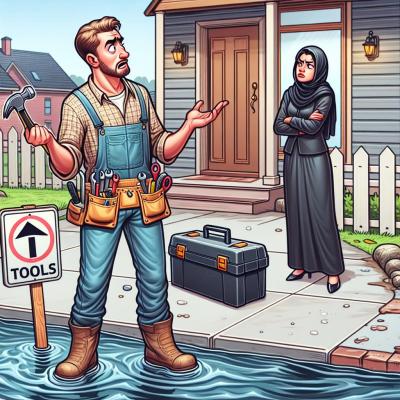The property owner filed his claim on February 25 last year after his area experienced heavy rainfall and landslides. The storm led to a blockage of debris on his driveway, making it impossible for him to access his home. For more than a month, he had to stay with a family member until he and some friends managed to temporarily fix the driveway, with the insurer's approval.
Inadequate Assessment
Suncorp, the insurer, acknowledged that the storm had indeed affected the area but disputed that it was a one-off event responsible for the damages. Initially, the insurer appointed a carpenter referred to as JLG to assess the property. However, JLG's expertise was questioned by the property owner, as he believed that an engineer was needed for an accurate evaluation.
Later, an engineer appointed by the insurer, referred to as ECE, reported that the erosion under the driveway was caused by a lack of proper drainage. According to ECE's findings, the damage was a result of a structural fault, which was not covered by the property owner's insurance policy.
Contradictory Findings
The property owner contested ECE's findings, claiming that they were inherently inconsistent. He pointed out that the engineer's report initially stated that there was "no drainage alongside the driveway," but later identified drainage in the same report. To counter the insurer's expert, the property owner hired an engineer of his own.
Furthermore, he provided video evidence showing that the gulley on the driveway was working effectively before the storm. He argued that the storm overwhelmed the drainage system, rendering it ineffective. He also highlighted that other roads in the area faced similar issues due to the landslides.
Acknowledging Inappropriate Assessment
The Australian Financial Complaints Authority (AFCA) recognized the inadequacy of JLG's assessment, referring to him as an "unsuitable contractor with irrelevant expertise." AFCA's ombudsman conceded that a carpenter like JLG was not qualified to provide an opinion on the property damage and the risk of driveway failure. The use of an inappropriate expert and the extended waiting period for the report were deemed violations of good industry practice.
AFCA also highlighted the limitations of ECE's conclusions, stating that the engineer did not consider the probable impact of the storm on the drainage system failures. The assessment of the drainage system did not account for the relevant standards present when the road was constructed several decades ago. Additionally, the expert reports failed to consider the significant rainfall during the storm, which could have overwhelmed even a better quality drainage system.
Resolution and Compensation
The ruling required Suncorp to seek quotes from qualified tradespeople to repair the driveway. The insurer was then required to settle the claim based on the higher of the two quotes, along with a 20% contingency for the transfer of risk. Suncorp also had to reimburse the property owner for the temporary repairs carried out, cover the professional costs for expert reports, and compensate him for non-financial losses amounting to $2000.
AFCA acknowledged that Suncorp's handling of the claim was delayed due to a high volume of claims from floods in NSW and Queensland. However, they determined that this only partially justified the delays. The communication breakdowns between the insurer and the property owner significantly impacted the claims process, and Suncorp apologized for these issues.
To read the full ruling by AFCA, click here: (source)
Published: Saturday 11th November, 2023
Please Note: If this information affects you or is relevant to your circumstances, seek advice from a licensed professional.










